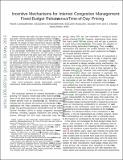| dc.contributor.author | Loiseau, Patrick | |
| dc.contributor.author | Schwartz, Galina | |
| dc.contributor.author | Musacchio, John | |
| dc.contributor.author | Amin, Saurabh | |
| dc.contributor.author | Sastry, S. Shankar | |
| dc.date.accessioned | 2014-08-26T12:31:10Z | |
| dc.date.available | 2014-08-26T12:31:10Z | |
| dc.date.issued | 2014-04 | |
| dc.date.submitted | 2013-01 | |
| dc.identifier.issn | 1063-6692 | |
| dc.identifier.issn | 1558-2566 | |
| dc.identifier.uri | http://hdl.handle.net/1721.1/89046 | |
| dc.description.abstract | Mobile data traffic has been steadily rising in the past years. This has generated a significant interest in the deployment of incentive mechanisms to reduce peak-time congestion. Typically, the design of these mechanisms requires information about user demand and sensitivity to prices. Such information is naturally imperfect. In this paper, we propose a fixed-budget rebate mechanism that gives each user a reward proportional to his percentage contribution to the aggregate reduction in peak-time demand. For comparison, we also study a time-of-day pricing mechanism that gives each user a fixed reward per unit reduction of his peak-time demand. To evaluate the two mechanisms, we introduce a game-theoretic model that captures the public good nature of decongestion. For each mechanism, we demonstrate that the socially optimal level of decongestion is achievable for a specific choice of the mechanism's parameter. We then investigate how imperfect information about user demand affects the mechanisms' effectiveness. From our results, the fixed-budget rebate pricing is more robust when the users' sensitivity to congestion is “sufficiently” convex. This feature of the fixed-budget rebate mechanism is attractive for many situations of interest and is driven by its closed-loop property, i.e., the unit reward decreases as the peak-time demand decreases. | en_US |
| dc.description.sponsorship | National Science Foundation (U.S.) (Grant CNS-1239166) | en_US |
| dc.description.sponsorship | National Science Foundation (U.S.) (Grant CNS-0910711) | en_US |
| dc.description.sponsorship | National Science Foundation (U.S.) (CCF-0424422) | en_US |
| dc.description.sponsorship | United States. Air Force Office of Scientific Research (FA9550-06-1-0244) | en_US |
| dc.language.iso | en_US | |
| dc.publisher | Institute of Electrical and Electronics Engineers (IEEE) | en_US |
| dc.relation.isversionof | http://dx.doi.org/10.1109/TNET.2013.2270442 | en_US |
| dc.rights | Creative Commons Attribution-Noncommercial-Share Alike | en_US |
| dc.rights.uri | http://creativecommons.org/licenses/by-nc-sa/4.0/ | en_US |
| dc.source | arXiv | en_US |
| dc.title | Incentive Mechanisms for Internet Congestion Management: Fixed-Budget Rebate Versus Time-of-Day Pricing | en_US |
| dc.type | Article | en_US |
| dc.identifier.citation | Loiseau, Patrick, Galina Schwartz, John Musacchio, Saurabh Amin, and S. Shankar Sastry. “Incentive Mechanisms for Internet Congestion Management: Fixed-Budget Rebate Versus Time-of-Day Pricing.” IEEE/ACM Transactions on Networking 22, no. 2 (April 2014): 647–661. | en_US |
| dc.contributor.department | Massachusetts Institute of Technology. Department of Civil and Environmental Engineering | en_US |
| dc.contributor.mitauthor | Amin, Saurabh | en_US |
| dc.relation.journal | IEEE/ACM Transactions on Networking | en_US |
| dc.eprint.version | Author's final manuscript | en_US |
| dc.type.uri | http://purl.org/eprint/type/JournalArticle | en_US |
| eprint.status | http://purl.org/eprint/status/PeerReviewed | en_US |
| dspace.orderedauthors | Loiseau, Patrick; Schwartz, Galina; Musacchio, John; Amin, Saurabh; Sastry, S. Shankar | en_US |
| dc.identifier.orcid | https://orcid.org/0000-0003-1554-015X | |
| mit.license | OPEN_ACCESS_POLICY | en_US |
| mit.metadata.status | Complete | |
